

5 fantastic examples of voice « BeKindRewrite. Photo by Anna Gutermuth Following last week’s post on how to find your voice, here are the first 100-ish words from five books with unique and strong voices; a mix of first and third person, and of new and classic authors.
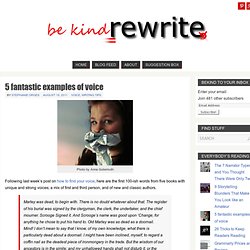
Marley was dead, to begin with. There is no doubt whatever about that. The register of his burial was signed by the clergyman, the clerk, the undertaker, and the chief mourner. Scrooge Signed it. Unnecessary words like “of my own knowledge,” “myself,” and “emphatically.” First the colors.Then the humans.That’s usually how I see things.Or at least, how I try. You can tell at a glance that Mr. Note the intentional wordiness, the amusing use of adverbs, how quickly he zeroes in from the hugeness of the universe to the ordinariness of digital watches. You don’t know about me, without you have read a book by the name of “The Adventures of Tom Sawyer,” but that ain’t no matter.
Breaking rules left and right here. All my life I’ve wanted to go to Earth. The 7 narrator types: and you thought there were only two! « BeKindRewrite. Photo by Charles Hutchins There are all kinds of narrators–going way beyond simple first or third person.
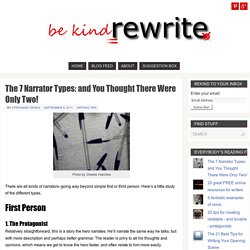
Here’s a little study of the different types. First Person 1. Literary Terms and Definitions A. Literary Terms and Definitions: A This page is under perpetual construction!
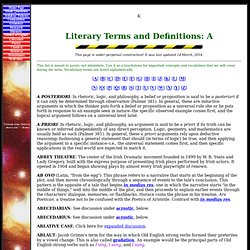
It was last updated 14 March, 2014. This list is meant to assist, not intimidate. Use it as a touchstone for important concepts and vocabulary that we will cover during the term. Vocabulary terms are listed alphabetically. Explicating Poetry. When asked to analyze or "explicate" a poem, it is a good idea to read the poem several times before starting to write about it (usually, they are short, so it is worth the time).
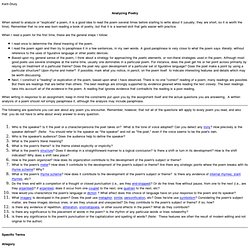
Remember that no one was born reading a book of poetry, but that it is a learned skill that gets easier with practice. When I read a poem for the first time, these are the general steps I follow: I read once to determine the literal meaning of the poem. I read the poem again and then try to paraphrase it in a few sentences, in my own words. A good paraphrase is very close to what the poem says literally, without reference to the uses of figurative language or other poetic devices.
The following are questions you can ask about any poem you encounter. Specific Terms Allegory An allegory is a narrative in which all (or most) of the events, locales, and characters correspond systematically to the events and characters in a completely different context. Ballad Diction Epic Figurative Language Form Imagery Irony Limerick Ode. Writing is Acting. Writers can spend days, weeks holed up in a room, churning out words, not knowing if their work is any good—engaging, or just shallow “busy work.”
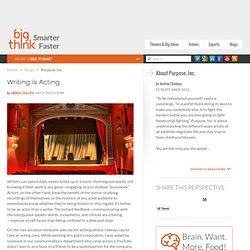
Actors, on the other hand, have the benefit of the mirror, studying recordings of themselves, or the reaction of any sized audience to immediately know whether they’re being honest. In this regard, it’s better to be an actor than a writer. The instant feedback—communicating with the energy your spoken words, movements, and choices are creating—improve a craft faster than being confined to a desk and chair. On the rare occasion someone asks me for writing advice, I always say to take an acting class. Eleanor Roosevelt on Happiness, Conformity, and Integrity. By Maria Popova “When you adopt the standards and the values of someone else … you surrender your own integrity.

You become, to the extent of your surrender, less of a human being.” Eleanor Roosevelt endures as one of the most memorable thinkers and doers in modern history — a relentless champion of working women and underprivileged youth, the longest-serving American First Lady, and the author of some beautiful, if controversial, love letters. When she was 76, Roosevelt penned You Learn by Living: Eleven Keys for a More Fulfilling Life (public library) — an elegantly written, relentlessly insightful compendium of her philosophy on the meaningful life. In the sixth chapter, “Learning to be Useful,” Roosevelt considers the secret of happiness — that elusive, shape-shifting aspiration of which such great hearts and minds as Henry David Thoreau, Alfred Hitchcock, Alan Watts, Martin Seligman, C. Eleanor Roosevelt Roosevelt writes:
30 Ideas for Teaching Writing. Summary: Few sources available today offer writing teachers such succinct, practice-based help—which is one reason why 30 Ideas for Teaching Writing was the winner of the Association of Education Publishers 2005 Distinguished Achievement Award for Instructional Materials.

The National Writing Project's 30 Ideas for Teaching Writing offers successful strategies contributed by experienced Writing Project teachers. Since NWP does not promote a single approach to teaching writing, readers will benefit from a variety of eclectic, classroom-tested techniques. These ideas originated as full-length articles in NWP publications (a link to the full article accompanies each idea below). Table of Contents: 30 Ideas for Teaching Writing 1. Debbie Rotkow, a co-director of the Coastal Georgia Writing Project, makes use of the real-life circumstances of her first grade students to help them compose writing that, in Frank Smith's words, is "natural and purposeful. " ROTKOW, DEBBIE. 2003. Back to top 2. 3. 4.